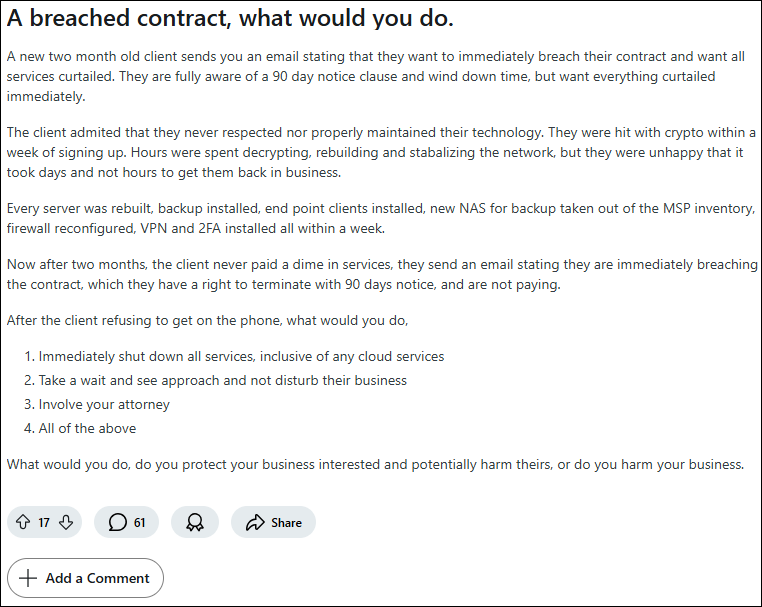Signed, sealed, delivered—the contract is yours. It’s fair to expect that when two parties enter into a legally binding contract, both sides will carry through with the terms in good faith.
However, things don’t always go as planned, leading to what’s called a breach of contract. A lot of actions can trigger a breach of contract, such as a late payment or a failure to meet agreed obligations or complete non-performance. Regardless of the cause, breaches can disrupt business operations and lead to costly disputes. So, what are the key elements that define a breach of contract? Let’s run through common causes, potential outcomes, and strategies to prevent or resolve disputes efficiently.
We’ll also discuss how proper contract review, powered by modern tools like AI contract review software, can also play a vital role in avoiding contractual risks.
What is a breach of contract?
In plain speak, a breach of contract occurs when one party fails to fulfill their obligations as outlined in a legally binding agreement. This failure can take several forms, ranging from not performing certain duties at all to incomplete or improper fulfillment of those duties.
Parties can also breach a contract by ending the agreement prematurely without a valid reason. The consequences of a breach vary depending on the severity of the violation, but every breach presents a disruption that can lead to legal disputes or financial losses.
Types of contract breaches
Depending on the severity and timing of the breach, the legal outcomes and remedies can vary. Below are the four most common types of breaches that can occur in a breach of agreement:
- Material breach. A material breach is a serious violation that affects the very core of the contract. It occurs when one party fails to perform a critical part of the agreement, rendering the contract fundamentally broken. Because the breach impacts the essence of the agreement, the non-breaching party is often justified in terminating the contract and seeking damages.
For example, if a company contracts a software developer to create a specific application, and the developer delivers software that doesn’t meet the agreed specifications or doesn’t function at all, this would be defined as a material breach. The non-breaching party can then end the contract and pursue compensation for any losses incurred due to the failure to fulfill the agreement’s primary objectives.
- Minor breach. A minor breach (or immaterial breach) occurs when one party fails to meet a small or insignificant obligation under the contract. Unlike a material breach, a minor breach doesn’t typically allow the non-breaching party to terminate the contract. Instead, the affected party may still be obligated to fulfill their end of the contract, but they can seek damages for any losses caused by the breach.
If a web designer delivers a functional website a few days late, this would be considered a minor breach. While the delay might cause inconvenience, it doesn’t substantially affect the delivery or avoid fulfilling the contract in total. The non-breaching party may be entitled to seek damages, but in most cases, the party will be unable to cancel the contract.
- Anticipatory breach. An anticipatory breach happens when one party clearly indicates—either through their words or actions—that they won’t meet their contractual obligations before the deadline stipulated in said contract. When an anticipatory breach happens, the other party can take immediate action, even before the contract has been formally violated.
Let’s say hypothetically that a supplier informs a buyer that they won’t be able to deliver materials on the agreed date, even though the deadline hasn’t yet passed. In that case, the buyer may treat this as an anticipatory breach and seek alternative arrangements. The non-breaching party can choose to immediately cancel the contract and seek damages or wait until the breach occurs.
- Actual breach. This is the most straightforward type of breach of agreement, where the failure to deliver goods, services, or payment is clear and actionable. Simply put, one of the parties refuses or fails to meet their contractual obligations at the time performance is due. That’s it.
If a client doesn’t pay for a service after it’s been provided as agreed in the contract, this would constitute an actual breach. The non-breaching side can seek legal action and claim damages, for one.
They can also ask for what’s called “specific performance,” where the breaching side has to fulfill their end of the bargain, if paying damages isn’t sufficient. Lastly, they can also ask for a contract cancellation, depending on the contract breach.
Common causes of breach of contract

Many contract disputes can crop up due to vague or poorly drafted agreements that leave room for interpretation. If a contract is unclear, it can lead to a host of misunderstandings, giving way to a perfect situation for one party to inadvertently commit a contract breach. That’s why it is crucial to conduct a thorough contract review.
There are many tools out there that can review contracts with a careful eye. Many of them provide an efficient contract review checklist that scans a contract to ensure that all the terms are clearly defined, so as to minimize a breach of contract. In fact, businesses that budget for contract review costs as part of their legal operations are better positioned to prevent potential legal issues such as a contract breach.
Below are some common causes that frequently lead to breaching the contract:
Failure to deliver goods or services
One of the most frequent causes of a breach of contract is the failure to deliver goods or services as specified. It could be anything from logistical issues, supply chain disruptions, or simply negligence, but when one party doesn’t provide what was stipulated, they’re breaching the contract.
For example, a manufacturer agrees to deliver a product by a set date, but then fails to do so, ultimately causing financial losses for the buyer.
Non-compliance with specifications
When a contract includes detailed specifications for products or services, non-compliance could result in a breach of contract. This one is pretty straightforward.
If you deliver goods that don’t meet quality standards or perform services that don’t align with contractual requirements, breaches can get serious and costly.
Late payments
Contracts often specify payment terms, including when and how much should be paid. Failing to make payments on time is a common reason for a breach of agreement.
Late payments can strain business relationships and also impact the cash flow of the non-breaching party. Even if the contractual breach is minor, it still entitles the contractor to seek legal remedies, like interest on the late payment or damages.
Breach due to miscommunication or misunderstandings
Lots of breaches happen simply because people aren’t on the same page. Unclear contract language, faulty assumptions, and miscommunication are often at the heart of the problem.
Deadlines get missed, expectations aren’t aligned, and performance requirements fall through the cracks—all leading to unintentional breaches. It’s a classic case of ‘I thought you meant this, but you actually meant that.’
If the terms aren’t crystal clear from the start, even the best intentions can lead to costly mistakes. The more you focus on nailing down the right wording and giving the contract a thorough review, the better.
That’s why a contract review checklist is your secret weapon. It helps cut down on those ‘Wait, what did we agree on?’ moments by making sure every single detail is transparent, vetted, and agreed upon.
Consequences of breach of contract
A breach of contract doesn’t just bring legal headaches—it can ripple through your entire business, straining relationships and throwing operations off course.
That’s why it’s so important to grasp the full picture of what could happen. When you have a clear understanding of the stakes involved, you can steer through disputes wisely.
Legal remedies
When a violation of a contract agreement occurs, courts typically offer certain legal solutions, or remedies, designed to compensate the non-breaching party or to ensure that the contract is fulfilled. These remedies include:
Damages. The most common contract breach remedy. Compensatory damages cover direct losses, such as extra costs incurred when a supplier fails to deliver goods as agreed. Consequential damages address indirect losses, like missed business opportunities caused by the breach.
Some contracts include liquidated damages, specifying a pre-determined amount, such as a daily penalty for late performance.
Specific performance. In cases where monetary damages can’t adequately cover the breach, courts can order what’s called specific performance. This basically requires the breaching party to fulfill their contractual obligations. Specific performance is most commonly applied to contract disputes involving unique goods/services that cannot easily be replaced.
Contract cancellation. The non-breaching party may be entitled to cancel the contract altogether. This remedy is often paired with restitution, which requires both parties to return any goods, services, or payments exchanged under the contract. For instance, if a contractor fails to complete a project as agreed, the client may be able to terminate the contract and demand the return of any payments made.
Each of these legal options can address a breach of contract, but the best way to act and what to do depends on the type and severity of the breach.
Impact on business relationships
Trust is the foundation of any successful business partnership, and breaching the contract severely damages that trust, making future collaborations difficult or impossible. This erosion of trust may:
Hurt future opportunities. A history of breaching contracts can tarnish a business’s reputation, discouraging potential partners from engaging in future deals. Word spreads quickly in industries, and repeated breaches can create long-term reputational harm.
Destroy partnerships. In the worst cases, a breach may lead to the dissolution of a business partnership altogether. Disputes over contract terms, combined with legal battles, can cause relationships to break down permanently, leading to lost opportunities and growth.
Create legal and financial risks. Engaging in contentious disputes following a breach of contract can be costly and time-consuming. Businesses should carefully weigh the financial, legal, and reputational risks of pursuing litigation versus finding an alternative dispute resolution.
Avoiding breaches in the first place is ideal—thorough contract management and review can help avoid misunderstandings that lead to disputes. When breaches do happen, it’s essential to consider both the legal consequences and the potential damage to business relationships before deciding how to proceed.
For more on mitigating contractual risks, check out this guide on managing contractual risks.
Preventing breach of contract
You have to deal with that breach when it happens, but wouldn’t it be better to avoid the headache altogether? Taking proactive steps—like drafting airtight contracts, encouraging open communication, and using smart contract management tech—puts you ahead of the game. If you do this, you could dodge a lot of the hassle and dramatically cut down the chances of ending up in a contractual dispute.
Use AI technology for contract management
Technology, especially AI, can be an impressive resource for managing contracts and reducing the likelihood of breaching the contract. When you’re juggling tons of contracts, tracking every obligation, deadline, and performance standard by hand, it can feel like a nightmare.
That’s where advanced contract management platforms swoop in to save the day, making the whole process smoother and way less stressful.
| AI contract management systems | Description |
| Monitor compliance | Track key contract milestones, such as payment schedules and deliverable deadlines, and alert businesses when obligations are due. |
| Automate notifications | Provide automated alerts for upcoming deadlines, preventing missed obligations that could lead to a breach of contract. |
| Analyze contract data | Analyze previous contracts to identify common sources of breaches so businesses can address recurring issues and improve future contracts. |
These systems keep everyone in the loop about duties and timelines. Automating much of the monitoring and compliance tracking will help you avoid common pitfalls that often lead to contract breaches.
Incorporate contract-drafting best practices
One of the most effective ways to prevent a breach of agreement is through meticulous contract drafting. Contracts should be written in clear, concise, and specific language to minimize the chances of ambiguity and a potential breach.
Think about it. Instead of saying, “deliver the product promptly,” a well-drafted contract would specify exact deadlines, delivery methods, and acceptable performance standards. Most of the time, precision leaves little room for contractual disputes over what each party is expected to do.
Aside from providing clarity, tools like AI contract review software can greatly improve the contract creation process. They analyze contracts for potential areas of conflict, inconsistent terms, loosely defined obligations, or risky clauses.
Be communicative with contracting parties
You’d be surprised, but many contract breaches boil down to one simple issue—poor communication.
Confusing expectations, mixed signals on deadlines, unclear deliverables, or miscommunication can turn a simple project into a full-blown dispute. To prevent a breach of contract, keep the conversation open and transparent from start to finish. Everyone should be clear on their roles, deadlines, and what’s expected. Regular check-ins and updates can help catch problems before they snowball into a breach.
For example, a client and contractor might hold weekly meetings to discuss project progress and address delays or modifications. This set of actions keeps both parties accountable, avoiding unwanted surprises.
What to do if a breach occurs?
Even with preventive measures, breaches can still happen. When faced with a breach of agreement, you need to act strategically to minimize the impact and resolve the issue as quickly as possible. How you handle the aftermath makes the difference in safeguarding your company’s legal and financial interests.
Assess the situation
The first step in responding to a breach of agreement is to assess its severity. Some breaches may be material, affecting the core of the contract, while others might be minor and easily resolved.
Take the example of a managed service provider (MSP) in a recent scenario from Reddit.

A client, two months into their contract, wanted to immediately terminate all services despite being aware of a 90-day notice clause. The client never paid for the services rendered, and after substantial work on the MSP’s part, the client still wanted everything curtailed without fulfilling their obligations.
So the refusal to communicate further complicated the situation, pushing the business to decide between shutting down services, seeking legal action, or continuing to maintain the client’s systems.
Material breach. If the breach is material, meaning it impacts the value or purpose of the contract, the non-breaching party can cancel the agreement and seek damages. E.g., in the Reddit case, the client’s failure to pay for critical services like server rebuilds and system security upgrades would likely constitute a material breach.
Minor breach. On the other hand, a minor breach may not justify terminating the contract. A minor breach refers to a failure to meet certain terms of the agreement without affecting the overall purpose of the contract. In these cases, the non-breaching party might still be required to uphold their side of the contract, but they can seek compensation for any losses resulting from the breach.
Once the severity of the breach is determined, you must decide whether to pursue legal action, negotiate an alternative resolution, or continue fulfilling said contractual obligations if the breach is minor and causes little harm.
In the scenario of the MSP from Reddit, given the severity and non-payment context, a more aggressive response involving legal counsel may be warranted to protect business interests.
Mitigation and negotiation
Litigation is usually the last resort anyone wants—it’s time-consuming, expensive, and can seriously strain business relationships. Luckily, in many cases, there’s a better way.
Alternative dispute resolution (ADR) methods like mediation or arbitration can help you sort things out without dragging everyone into a courtroom. They’re faster, more cost-effective, and way less adversarial than going to court.
- Mediation. A neutral third party helps facilitate negotiations between parties to reach a mutually agreeable resolution. Mediation is effective for keeping business relationships intact.
- Arbitration. In arbitration, an arbitrator listens to both sides and makes a binding decision on how to settle the dispute. It’s a more formal process than mediation but less complex and expensive.
Choosing to negotiate in good faith or opt for ADR methods can stop a breach of agreement from escalating into a prolonged, messy, legal battle. At the end of the day, maintaining open communication is what gives both parties a chance to resolve the issue in a way that benefits everyone involved.
Seek legal advice
In cases where the breach is serious or negotiations fail, it might be time to call in the pros. Expert legal advice is critical at this point. Depending on the details of the breach of contract, legal professionals can help your business decide what to do. They can tell you how to get money for damages, ask for specific performance, or even end the contract altogether.
AI legal tools. Modern businesses have the advantage of using AI legal management platforms to assess the severity of the breach and determine the most suitable remedy. These tools can assess the contract terms, track obligations, and provide insights into the potential legal outcomes. With AI, you can make informed decisions without necessarily incurring the contract review cost of lengthy consultations.
No matter the situation, bringing in legal experts is key to protecting your business’s rights. Experts can help you pursue the most appropriate remedy based on the specific circumstances of the contractual breach.
Staying ahead of contractual disputes
A breach of contract has the potential to disrupt business operations, damage partnerships, and result in legal and financial consequences. But, the right steps to prevent these situations are practical and essential for maintaining smooth operations. Clear, well-drafted contracts, combined with effective communication between all parties, can reduce the chances of misunderstandings that lead to breaches.
Using modern tools, like AI contract review software, can further safeguard businesses by flagging potential issues early in the contract review process. These advanced technology tools help catch ambiguous language, conflicting terms, or risky clauses before they become larger problems.
When a breach does occur, assess the severity—whether it’s a material or minor breach—and determine the best course of action. Exploring alternatives to litigation, such as mediation or arbitration, can often resolve disputes more and preserve business relationships. However, when necessary, seeking legal advice helps shield your business while also pursuing the appropriate remedies.
Taking a proactive approach to contract management and being prepared for potential breaches can minimize disruption and protect interests. In turn, you end up strengthening the foundation of your contractual relationships.







By entering your email, you agree to our Terms & Conditions and Privacy Policy.